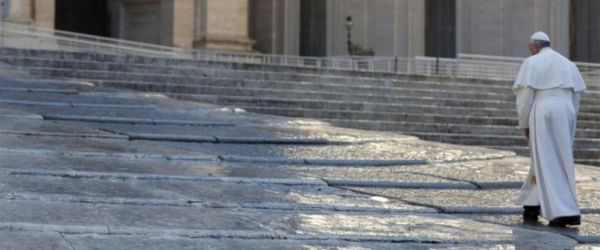In the Gospel of today’s liturgy, we see Jesus beginning his preaching (cf. Lk 4:14-21): it is Jesus’ first sermon. He goes to Nazareth, where he grew up, and participates in prayer in the synagogue. He gets up to read and, in the scroll of the prophet Isaiah, he finds the passage regarding the Messiah who proclaims a message of consolation and liberation for the poor and oppressed (cf. Is 61:1-2). At the end of the reading, “the eyes of all… were fixed on him” (v. 20). And Jesus begins by saying: “Today this scripture has been fulfilled” (v. 21). Let us dwell on this today. It is the first word of Jesus’ preaching recorded in the Gospel of Luke. Pronounced by the Lord, it indicates a “today” that runs through all ages and always remains valid. The Word of God is always “today”. It begins with a “today”: when you read the Word of God, a “today” begins in your soul, if you understand it well. Today. Isaiah’s prophecy dates back to earlier centuries, but Jesus, “in the power of the Spirit” (v. 14), makes it relevant and, above all, brings it to fulfilment, and shows how to receive the Word of God: today. It is not like ancient history, no: today. It speaks to your heart today.
Jesus’ fellow countrymen are struck by his word. Even though, clouded by prejudice, they do not believe him, they realize that his teaching is different from that of the other teachers (cf. v. 22): they sense that there is more to Jesus. What is there? There is the anointing of the Holy Spirit. Sometimes it happens that our sermons and our teachings remain generic, abstract; they do not touch the soul and the life of the people. And why? Because they lack the power of this today; what Jesus “fills with meaning” in the power of the Spirit, is today. He is speaking to you today. Yes, at times one hears impeccable conferences, well-constructed speeches, which however, do not move the heart and so everything remains as before. Even many homilies — I say this with respect but with pain — are abstract, and instead of awakening the soul, they put it to sleep. When the faithful start looking at their watches — “when will this end?” — they put the soul to sleep. Preaching runs this risk: without the anointing of the Spirit, it impoverishes the Word of God, and deteriorates to moralism or abstract concepts; it presents the Gospel with detachment, as if it were outside time, far from reality. And this is not the way. But a word in which the power of today does not pulsate, is not worthy of Jesus and does not help people’s lives. This is why those who preach, please, should be the first to experience the today of Jesus, in order to be able to communicate it in the today of others. And if they want to give lectures, conferences, let them do so, but elsewhere, not at the time of the homily where they must give the Word in a way that rouses hearts.
[Pope Francis, Angelus 23 January 2022]












